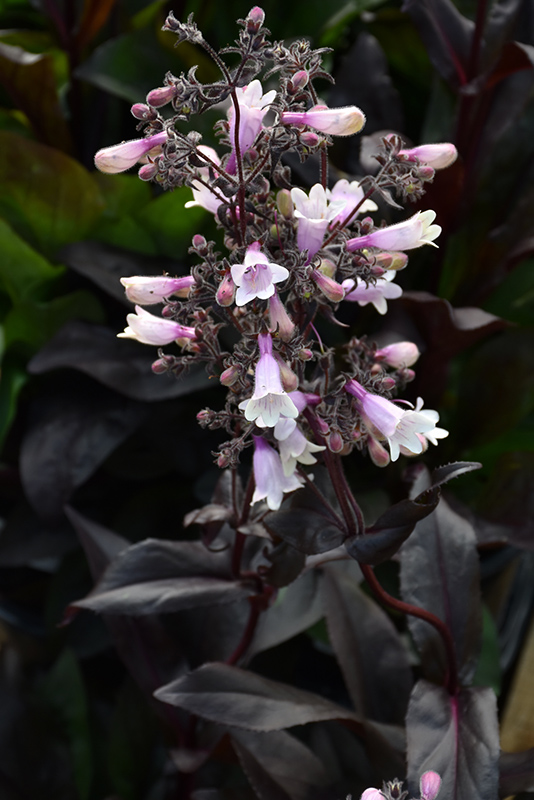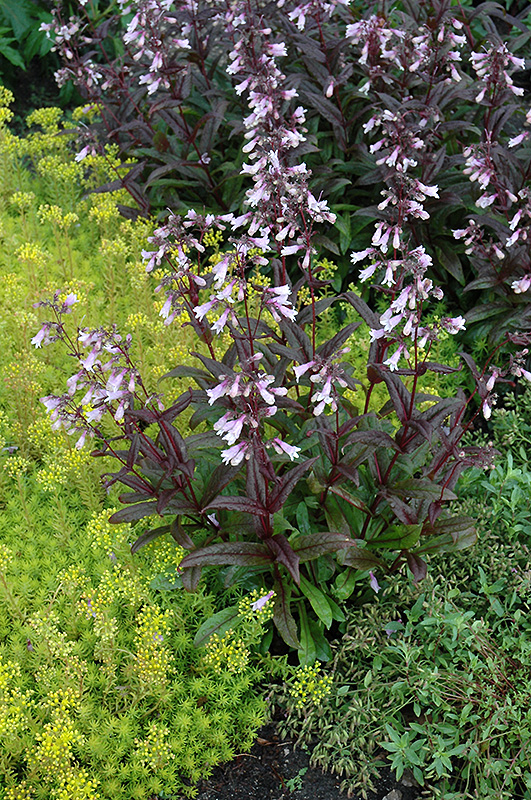Dark Towers Beard Tongue*
Penstemon 'Dark Towers'
* This is a "special order" plant - contact store for details
Plant Height: 24 inches
Flower Height: 3 feet
Spacing: 18 inches
Sunlight:
![]()
![]()
Hardiness Zone: 3b
Other Names: Beardtongue
Ornamental Features
Dark Towers Beard Tongue has masses of beautiful spikes of white tubular flowers with a pink reverse rising above the foliage from early to mid summer, which emerge from distinctive violet flower buds, and which are most effective when planted in groupings. The flowers are excellent for cutting. Its attractive glossy narrow leaves emerge burgundy in spring, turning dark green in colour with distinctive deep purple edges. The foliage often turns brown in fall. The deep purple stems are very colorful and add to the overall interest of the plant.
Landscape Attributes
Dark Towers Beard Tongue is an herbaceous perennial with an upright spreading habit of growth. Its medium texture blends into the garden, but can always be balanced by a couple of finer or coarser plants for an effective composition.
This is a relatively low maintenance plant, and is best cleaned up in early spring before it resumes active growth for the season. It is a good choice for attracting butterflies and hummingbirds to your yard. It has no significant negative characteristics.
Dark Towers Beard Tongue is recommended for the following landscape applications;
- Mass Planting
- General Garden Use
- Container Planting
Planting & Growing
Dark Towers Beard Tongue will grow to be about 24 inches tall at maturity extending to 3 feet tall with the flowers, with a spread of 24 inches. When grown in masses or used as a bedding plant, individual plants should be spaced approximately 18 inches apart. It grows at a fast rate, and under ideal conditions can be expected to live for approximately 10 years. As an herbaceous perennial, this plant will usually die back to the crown each winter, and will regrow from the base each spring. Be careful not to disturb the crown in late winter when it may not be readily seen!
This plant does best in full sun to partial shade. It prefers dry to average moisture levels with very well-drained soil, and will often die in standing water. It is considered to be drought-tolerant, and thus makes an ideal choice for a low-water garden or xeriscape application. It is not particular as to soil type or pH. It is somewhat tolerant of urban pollution. This particular variety is an interspecific hybrid. It can be propagated by cuttings; however, as a cultivated variety, be aware that it may be subject to certain restrictions or prohibitions on propagation.
Dark Towers Beard Tongue is a fine choice for the garden, but it is also a good selection for planting in outdoor pots and containers. With its upright habit of growth, it is best suited for use as a 'thriller' in the 'spiller-thriller-filler' container combination; plant it near the center of the pot, surrounded by smaller plants and those that spill over the edges. It is even sizeable enough that it can be grown alone in a suitable container. Note that when growing plants in outdoor containers and baskets, they may require more frequent waterings than they would in the yard or garden. Be aware that in our climate, most plants cannot be expected to survive the winter if left in containers outdoors, and this plant is no exception. Contact our experts for more information on how to protect it over the winter months.
* This is a "special order" plant - contact store for details

